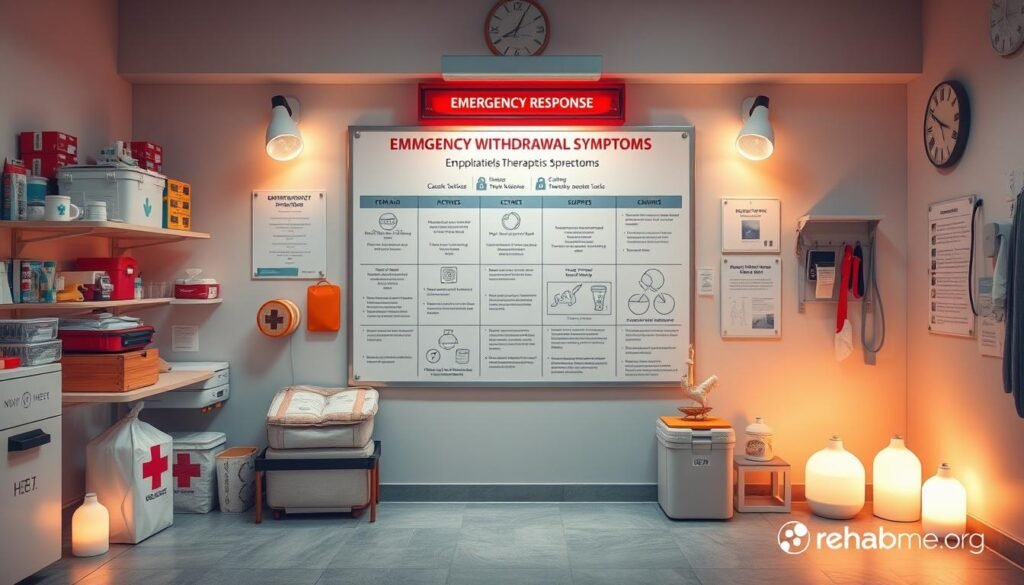I’ve seen how addiction hurts families and individuals. I want to help by sharing what I know about managing withdrawal symptoms. When someone stops using a substance, their body goes through changes. This is why coping with withdrawal and finding relief strategies are so important.
Recent stats show that 82,000 people died from opioid overdoses in 2022. This shows how vital it is to get help for withdrawal symptoms. For more info, check out treatment for withdrawal symptoms and other trusted sources.
It’s key to understand the challenges of withdrawal to find relief. Recognizing the symptoms is the first step towards recovery. Treatments like medical detox and counseling can help manage these symptoms and support sobriety.
Key Takeaways
- Withdrawal symptoms occur when an individual stops using a substance, leading to physical and psychological symptoms.
- Effective treatments for withdrawal symptoms include medical detoxification, counseling, and support groups.
- Coping with withdrawal requires a holistic approach, including symptom relief strategies and professional help.
- Medication-assisted treatment (MAT) can help prevent relapse and promote recovery.
- Opioid detox without further support increases the risk of relapse, overdose, and death.
- Seeking professional help is essential to manage withdrawal symptoms safely and effectively.
Understanding the Challenge of Withdrawal
Withdrawal is a sign of dependence on a substance. It’s important to seek help. Overcoming withdrawal symptoms is a big step towards recovery. There are many ways to manage withdrawal discomfort and get support.
Withdrawal symptoms can be physical or psychological. Physical symptoms include nausea, vomiting, and tremors. Psychological symptoms include anxiety, depression, and irritability.
The time it takes for symptoms to appear varies. For example, opioid withdrawal symptoms start within 12 hours. They peak at 36-72 hours and last 4-7 days.
Common Physical Symptoms
Some common physical symptoms of withdrawal include:
- Aches and pain
- Muscle spasms and twitching
- Tremors
- Abdominal cramps
- Nausea and vomiting
Psychological Effects
Psychological effects of withdrawal can be tough, including:
- Anxiety and restlessness
- Irritability
- Insomnia
- Depression
Timeline Expectations
Knowing when withdrawal symptoms will appear is key. With the right support, people can manage symptoms and recover.
Treatment for Withdrawal Symptoms: Medical Approaches
When facing withdrawal effects, finding the right treatment is key. Medical treatments can help ease these symptoms, making detox easier. Doctors might prescribe methadone, buprenorphine, or clonidine to lessen withdrawal’s impact.
These drugs are often paired with counseling and support groups for a full recovery plan. It’s important to work with a doctor to find the best treatment. They can help you through withdrawal and create a recovery plan just for you.
Some common medical treatments for withdrawal include:
- Methadone maintenance therapy
- Buprenorphine treatment
- Clonidine therapy
Exploring these medical options and consulting with a healthcare professional can lead to effective treatment. Remember, overcoming withdrawal is a journey. Be kind to yourself and stay patient.
| Medication | Use |
|---|---|
| Methadone | Treatment of opioid withdrawal |
| Buprenorphine | Treatment of opioid withdrawal |
| Clonidine | Treatment of withdrawal symptoms |
Natural Remedies and Holistic Solutions
In my search for withdrawal symptoms relief, I’ve found that natural remedies and holistic solutions are key. They help manage substance use disorder alongside medical treatments. This makes for a well-rounded addiction help plan.
Herbal supplements like ginseng and St. John’s Wort can ease withdrawal symptoms. They help with anxiety and depression. Mindfulness practices, such as meditation and yoga, also help manage stress and anxiety. This makes the withdrawal process easier to handle.
To learn more about managing withdrawal symptoms and getting addiction help, check out rehabme.org. They offer insights into the journey to sobriety and what alcohol rehab entails.
Here are some important points to remember about natural remedies and holistic solutions for withdrawal symptoms relief:
- Herbal supplements can help reduce anxiety and depression
- Mindfulness techniques can help cope with stress and anxiety
- Alternative therapies like acupuncture and massage can promote overall well-being
By adding these natural remedies and holistic solutions to a addiction help plan, people can manage their withdrawal symptoms better. This helps them on their path to recovery from substance use disorder.
Creating Your Support System
Managing withdrawal symptoms is tough, but having a strong support system helps a lot. This includes family, friends, and healthcare professionals. They offer emotional support and guidance during recovery. For example, Solution Based Treatment provides detox, residential rehab, and outpatient programs to help with symptoms.
A support system is key to managing withdrawal symptoms and avoiding relapse. It keeps individuals motivated and focused on their recovery goals. Support for withdrawal symptoms can come from many places. Support groups like Narcotics Anonymous and Alcoholics Anonymous offer a sense of community. Healthcare professionals also provide guidance and help develop strategies for managing symptoms.
Having a support system brings many benefits, including:
- Emotional support and guidance
- Help with managing withdrawal symptoms
- Accountability and motivation
- Connection with others who are going through similar experiences

For addiction recovery support, a stable and supportive environment is vital. It helps ease the stress of withdrawal and aids in recovery. Encouraging healthy habits like exercise, balanced nutrition, and proper sleep is important. With a strong support system, individuals can better manage symptoms and achieve long-term recovery success.
| Support System Component | Benefits |
|---|---|
| Family and Friends | Emotional support, motivation, and accountability |
| Healthcare Professionals | Guidance, support, and medical care |
| Support Groups | Connection with others, sense of community, and shared experiences |
Lifestyle Modifications for Symptom Management
Managing withdrawal symptoms is a big challenge. I’ve learned that changing my lifestyle helps a lot. Eating well, exercising, and sleeping enough are key. These habits help me feel better and live healthier.
Eating right is important. Foods like fruits, veggies, and whole grains help with nausea and vomiting. Drinking lots of water helps with headaches and feeling tired. For more help, addiction counseling can guide you on nutrition and staying hydrated. A healthy lifestyle makes treatment work better.
Exercise and moving around helps with anxiety and depression. Good sleep habits improve sleep and reduce insomnia. Making these changes helps manage symptoms and improves life quality. Remember, addiction counseling and withdrawal symptoms treatment vary for everyone. Lifestyle changes are a big part of recovery.
| Lifestyle Modification | Benefits |
|---|---|
| Healthy Diet | Reduces nausea and vomiting, improves overall health |
| Regular Exercise | Reduces anxiety and depression, improves mood |
| Adequate Sleep | Improves sleep quality, reduces symptoms like insomnia |
By making these lifestyle changes, I manage my symptoms better. Remember, managing withdrawal discomfort is a journey. Be patient and kind to yourself as you recover.
Emergency Response Planning
Dealing with withdrawal symptoms is tough, and having a plan for emergencies is key. I keep a list of important numbers, like my doctor and a crisis hotline, handy. Programs like detoxification can ease symptoms, but being ready for anything is vital during addiction recovery.
If an emergency happens, knowing what to do is critical. This might mean calling for help or getting to a hospital fast. Having a plan can lower stress and make sure I get the help I need quickly. Important parts of emergency planning include:
- Having a list of emergency contact numbers
- Knowing what steps to take in case of an emergency
- Having a plan for seeking immediate medical attention

Being ready and having a plan lets me focus on getting better. With the right effective treatments and support, I can beat withdrawal symptoms and reach long-term recovery.
Professional Treatment Options
Managing withdrawal symptoms can be tough. Professional treatment options offer the support and guidance needed for recovery. Addiction treatment programs provide various services. These include inpatient care, outpatient programs, and medication-assisted treatment.
These programs help create a personalized plan for withdrawal management and withdrawal support. They address each person’s unique needs. Medications like methadone and buprenorphine help reduce withdrawal symptoms. This makes detox easier.
Some common treatment options include:
- Inpatient care: a structured and supportive environment for individuals to receive around-the-clock care and supervision.
- Outpatient programs: flexible and convenient programs that allow individuals to receive treatment while they maintain their daily routines.
- Medication-assisted treatment: the use of medications like methadone and buprenorphine to reduce withdrawal symptoms and cravings.
For more information on drug rehab groups and professional treatment options, individuals can consult with a healthcare professional or a reputable treatment center.
Monitoring Progress and Adjusting Treatment
My journey to beat substance use disorder has taught me the value of tracking my progress. I watch my symptoms, set goals, and get addiction help when I need it. This helps me spot patterns and make smart choices about my treatment.
Some important things to keep an eye on include:
- Tracking physical and emotional symptoms
- Setting realistic milestones and goals
- Seeking support from healthcare professionals and support groups
- Being patient and flexible with my treatment plan
The withdrawal process is tough and can be unpredictable. But with my healthcare team’s help and extra support when needed, I can face any challenges. With the right care, I can manage my symptoms and live a happy, healthy life.
| Substance | Common Withdrawal Symptoms |
|---|---|
| Alcohol | Anxiety, hostility, irritability, depression, fatigue |
| Benzodiazepines | Anxiety, insomnia, depression, fatigue |
| Opioids | Sleep disruption, anxiety, depression, fatigue, irritability |
Knowing the common withdrawal symptoms helps me prepare for what’s ahead. It also helps me find the right addiction help for my recovery.
Conclusion: Your Path to Recovery and Healing
Recovery from heroin addiction may seem tough, but it’s full of hope. It leads to a healthier, happier life. Managing withdrawal and changing your lifestyle is hard, but with the right help, you can do it.
Remember, your recovery is unique and personal. It’s okay to take it one step at a time. By getting professional help, building a strong support system, and adding holistic practices to your day, you can beat the challenges and take back your life.
Embrace the journey, celebrate your wins, and don’t be afraid to ask for help when you need it. With determination and the right tools, you can start a path of healing and recovery. You can live a fulfilling and meaningful life.
